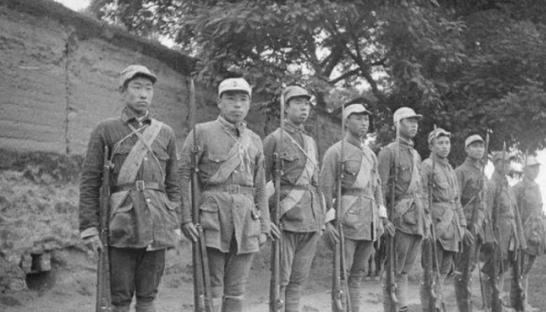preface:
During the War of Resistance Against Japanese Aggression, with the continuous development of the battlefield situation, the Eighth Route Army also underwent great changes. In April 1938, in order to strengthen the anti-Japanese armed forces of the Eighth Route Army. In accordance with the requirements of the central authorities, the Jin-Cha-Ji Military Region established the subordinate second-level military region, the Jizhong Military Region, which was a famous main brigade of our army during the War of Resistance Against Japanese Aggression. This team is full of talents and brilliant achievements, and has created many founding heroes. For example, Lieutenant General Han Wei and Lieutenant General Zhang Cunshi, but Wang Changjiang, who was their leader, was only awarded the rank of colonel.

The Eighth Route Army's Jizhong Military Region Garrison Brigade
The predecessor of the garrison brigade of the Jizhong Military Region was not the armed army of the Eighth Route Army, but a detachment led by Zhang Yinwu. At that time, in order to unite this force in the War of Resistance Against Japan, some political cadres of the Eighth Route Army came to work in the army. Zhang Zhang was a diehard who did not concentrate on resisting Japan, but only engaged in some small actions. Zhang Yinwu's behavior seriously aroused the dissatisfaction of military officers. In this case, his compatriot Wang Changjiang led an armed uprising of nearly two regiments, broke away from this army and joined the Eighth Route Army.
Later, the Jizhong Military Region ordered Zhang Cunshi and Wang Changjiang to reorganize the rebel forces into two combat regiments, which went to the Hejian Sanlipu area. Here, they learn while fighting, and constantly exercise in actual combat. Later, this unit was awarded the title of Jizhong People's Army, with a native of Boye County, Hebei Province, as commander, and Zhang Cunshi, a native of LiXian County, Hebei Province, as deputy commander.
Subsequently, Wang Changjiang led his troops to cooperate with friendly forces in pursuit of the enemy's 97th Army. During this period, more than a thousand enemy troops were annihilated, showing the style of a main force regiment. After the war, the brigade was warmly praised by Liu Division Commander of the 129th Division of the Eighth Route Army. In May 1940, the unit returned to the Jizhong base area. In August of the same year, brigade commander Wang Changjiang was honorably joined the party.
Wang Changjiang was born in November 1899 in West Street, Boye County, Hebei Province. He grew up in a wealthy family and graduated from the ninth term of the famous Baoding Military Academy. In 1933, the Great Wall War of Resistance broke out immediately, so Wang Changjiang participated in this campaign. For his outstanding performance, he was awarded the famous Order of the Blue Sky and White Sun.
The origin of "King Madman"
In 1944, the U.S. military sent some officers to the eighth route army's active area. At that time, Wang Changjiang was ordered to receive him, and at that time, the enemy was strong and we were weak. It is reasonable to complete the task calmly and avoid contact and combat with the enemy as much as possible, but Wang Changjiang does not think so.
However, in the process of leading the troops to escort the AMERICAN troops, Wang Changjiang took the initiative to exchange fire with the enemy. Therefore, Wang Changjiang personally led his troops and captured the enemy's stable stronghold. When the Americans arrived the next day, the stronghold was still burning. Wang's battle impressed American officer Foreman and made him feel that the moderate eighth route army chief was a militant.
The Battle of Fort Concorde was then fought, and after the battle, the Eighth Route Army killed more than 20 Japanese soldiers and captured 4 Japanese soldiers under Cao Chang. At the same time, more than 100 puppet troops were captured, and our army also captured 1 light machine gun and more than 50 rifles. In this way, I got the nickname of "King Madman".
Why was it awarded to the Colonel
Although it is said that before and after the end of the War of Resistance Against Japanese Aggression, Wang Changjiang held many important positions. But then he introduced an old subordinate to work at an oil refinery in Shijiazhuang. Unexpectedly, this person turned out to be a spy, and General Wang Changjiang was also implicated. Because of his own problems, he was only awarded the rank of colonel.